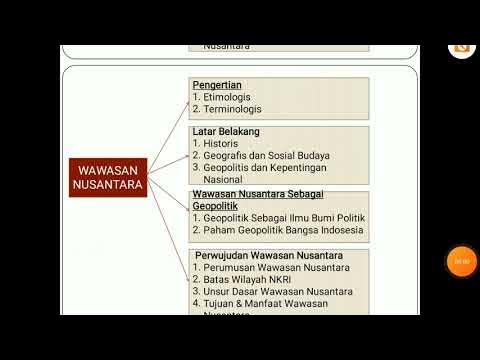Part #3 Kedudukan, Sifat dan Fungsi Peraturan Perundang Undangan
Summary
TLDRThis video explains the concept, position, and functions of legislation in Indonesia's legal system. It highlights that Indonesia is a state governed by law, with all aspects of life regulated by legal norms. It discusses the hierarchy of laws under the 1945 Constitution, including various legislative bodies responsible for creating these laws. The video outlines the main functions of legislation, such as creating, updating, and integrating legal systems, ensuring legal certainty, and solving societal issues. It emphasizes the importance of clear language and consistency in drafting laws.
Takeaways
- 📜 Indonesia is a country based on law, meaning all aspects of life must follow legal rules.
- ⚖️ The highest legal authority in Indonesia is the 1945 Constitution (UUD 1945), followed by other laws under it.
- 🏛️ Regulations under the UUD 1945 include decisions by the People's Consultative Assembly (MPR), laws (UU), government regulations, presidential regulations, provincial regulations, and local/city regulations.
- 📋 Various institutions, including the MPR, DPR, DPD, Supreme Court, Constitutional Court, and others, have the authority to create legal regulations.
- 🛠️ The main function of legislation is to enforce the rule of law in accordance with the mandates of the UUD 1945.
- 📝 Law creation is key in building a cohesive legal system, providing a foundation for national law.
- 🔄 Legislation serves as an instrument for legal reform, replacing customary law or jurisprudence when necessary.
- 🛡️ The role of national law is to integrate different legal systems in Indonesia: continental law, customary law, religious law, and national law.
- ✅ Legal certainty is a fundamental principle of law enforcement, and legislation offers more certainty than customary law or jurisprudence.
- 🔍 The function of law is to resolve societal problems, protect human rights, and clearly define the legal status and behavior of individuals.
Q & A
What is meant by 'peraturan perundang-undangan' in the context of Indonesia?
-'Peraturan perundang-undangan' refers to all laws and regulations created by authorized institutions under the framework of the 1945 Constitution (UUD 1945), which guide and regulate societal, national, and state life in Indonesia.
What are the different types of 'peraturan perundang-undangan' in Indonesia as stated in the script?
-The types include: 1) People's Consultative Assembly (MPR) decrees, 2) Laws or Government Regulations in lieu of laws (Perpu), 3) Government Regulations, 4) Presidential Regulations, 5) Provincial Regulations, and 6) Regency or City Regulations.
How does 'peraturan perundang-undangan' function within Indonesia's national legal system?
-They serve as implementing rules that fulfill the mandate of the rule of law in Indonesia, as prescribed by the 1945 Constitution. They also ensure orderly conduct within society by providing legal certainty and standardizing legal guidelines.
What role does 'peraturan perundang-undangan' play in law creation?
-It is the primary method for creating laws that set general standards and norms, making it a cornerstone of the national legal system.
What is the function of 'peraturan perundang-undangan' in legal reform?
-It acts as an effective tool for legal reform by updating laws, contrasting with traditional laws such as customary law or jurisprudence, which evolve more slowly.
How does 'peraturan perundang-undangan' contribute to legal certainty?
-It provides a higher level of legal certainty compared to customary or judicial precedents, ensuring that the laws are clear, consistent, and written in accessible language to guarantee understanding and enforceability.
What is meant by the integration of various legal systems within 'peraturan perundang-undangan'?
-Indonesia’s legal system includes multiple frameworks: continental law, customary law, religious law, and national law. 'Peraturan perundang-undangan' aims to harmonize these systems, creating a coherent national legal order.
What is the purpose of 'peraturan perundang-undangan' in solving societal issues?
-These laws and regulations aim to address specific societal issues by defining acceptable behaviors, protecting human rights, and regulating interactions to maintain public order.
Why is the clarity of language important in 'peraturan perundang-undangan'?
-Clear language is essential to ensure that the laws are easily understandable, thereby enabling their proper implementation and compliance by the general public.
How does 'peraturan perundang-undangan' protect human rights in Indonesia?
-It ensures the protection of human rights by clearly defining the legal status of individuals and providing legal protections that align with the rule of law, as enshrined in the 1945 Constitution.
Outlines

هذا القسم متوفر فقط للمشتركين. يرجى الترقية للوصول إلى هذه الميزة.
قم بالترقية الآنMindmap

هذا القسم متوفر فقط للمشتركين. يرجى الترقية للوصول إلى هذه الميزة.
قم بالترقية الآنKeywords

هذا القسم متوفر فقط للمشتركين. يرجى الترقية للوصول إلى هذه الميزة.
قم بالترقية الآنHighlights

هذا القسم متوفر فقط للمشتركين. يرجى الترقية للوصول إلى هذه الميزة.
قم بالترقية الآنTranscripts

هذا القسم متوفر فقط للمشتركين. يرجى الترقية للوصول إلى هذه الميزة.
قم بالترقية الآنتصفح المزيد من مقاطع الفيديو ذات الصلة

PANCASILA dalam Staatfundamentalnorm | Norma Dasar Negara

Bab 2 Aktivitas Belajar 2.2 Kedudukan UUD NRI Tahun 1945

Wewenang dan Cara Memperolehnya - HUKUM ADMINISTRASI NEGARA

Part #2 Kedudukan, Sifat dan Fungsi #UUD NRI 1945

Hubungan Pancasila dengan Proklamasi dan Pembukaan UUD 1945 - Pendidikan Pancasila #03

Daring (Wawasan Nusantara Part 1)
5.0 / 5 (0 votes)
